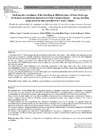Identificador persistente para citar o vincular este elemento:
https://accedacris.ulpgc.es/jspui/handle/10553/56122
| Título: | Studying the compliance of the labelling in different types of farm fresh eggs for human consumption marketed in Gran Canaria (Spain) – An egg labelling proposition for those produced in Canary Islands | Otros títulos: | Estudo da conformidade da rotulagem em diferentes tipos de ovos frescos para consumo humano comercializados em Gran Canaria (Espanha) – Uma proposta de rotulagem para ovos produzidos nas Ilhas Canárias | Autores/as: | López, Melissa Carrascosa Iruzubieta, Conrado Javier Millán Larriva, Rafael Hitatí Negro, Graciela Raposo, António Sanjuán Velázquez, Esther |
Clasificación UNESCO: | 3206 Ciencias de la nutrición | Palabras clave: | Canary Islands Eggs labelling Eggs legislation Eggs packaging Hens production systems, et al. |
Fecha de publicación: | 2018 | Publicación seriada: | Jornal de investigação biomédica e biofarmacêutica | Resumen: | A literature review of the European and Spanish legislation has been made related to the labelling and packaging of eggs for human consumption to identify if there are any deficiencies in the current regulations, and to verify the compliance of the information given by the labelling in the marketed eggs in Gran Canaria (Spain). To this end, eighteen eggs labels were collected directly from commercial establishments in a way that ensured representation of all different production systems (furnished cages, deep litter, free-range and organic), as well as the hen and quail species. The study showed a high fulfilment of the mandatory parameters in hen eggs, with a few flaws in the storage recommendations and the egg classification of some of the free-range eggs. Likewise, many of the optional parameters were met in all the production systems noted.In quail eggs, important deficiencies were found regarding the mandatory information showed in their labels; these were unjustified omissions from a legal point of view. Finally, a proposal for implementing a labelling guide for the fresh eggs produced and marketed in Canary Islands is made that fulfils the current legislation and the specific needs in the marketing of these products. Foi realizada uma revisão bibliográfica da legislação europeia e espanhola relacionada com a rotulagem e embalagem de ovos para consumo humano, para identificar eventuais deficiências na regulamentação vigente e para verificar a conformidade das informações fornecidas pela rotulagem nos ovos comercializados em Gran Canaria (Espanha).Nesse sentido, dezoito rótulos de ovos foram recolhidos directamente dos estabelecimentos comerciais, de forma a garantir a representação de todos os diferentes sistemas de produção (gaiolas, solo, campo e orgânico), bem como as espécies galinha e codorniz.O estudo mostrou um alto cumprimento dos parâmetros obrigatórios em ovos de galinha, com algumas falhas nas recomendações de armazenamento e na classificação de ovos de alguns dos ovos de galinhas do campo. Da mesma forma, muitos dos parâmetros opcionais foram cumpridos em todos os sistemas de produção observados.Nos ovos de codorniz, foram encontradas deficiências importantes relativamente à informação obrigatória apresentada nos rótulos; omissões injustificadas do ponto de vista legal.Por último, é apresentada uma proposta de implementação de um guia de rotulagem dos ovos frescos produzidos e comercializados nas Ilhas Canárias, que cumprem a legislação em vigor e as necessidades específicas na comercialização destes produtos. |
URI: | https://accedacris.ulpgc.es/handle/10553/56122 | ISSN: | 2182-2379 | DOI: | 10.19277/BBR.15.2.181 | Fuente: | Jornal de investigação biomédica e biofarmacêutica [ISSN 2182-2379], v. 15 (2), p. 138-155 |
| Colección: | Artículos |
Visitas
80
actualizado el 11-ene-2026
Descargas
88
actualizado el 11-ene-2026
Google ScholarTM
Verifica
Altmetric
Comparte
Exporta metadatos
Los elementos en ULPGC accedaCRIS están protegidos por derechos de autor con todos los derechos reservados, a menos que se indique lo contrario.
